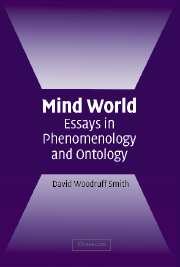Book contents
- Frontmatter
- Contents
- Prolegomena: The Terroir of Consciousness and the World
- Origins of the Essays
- Overview: A Story Line
- The Picture
- 1 Three Facets of Consciousness
- 2 The Cogito circa a.d. 2000
- 3 Return to Consciousness
- 4 Consciousness in Action
- 5 Background Ideas
- 6 Intentionality Naturalized?
- 7 Consciousness and Actuality
- 8 Basic Categories
- Coda: The Beetle in the Box
- Appendix: Background Conceptions of Ontology, Phenomenology, Philosophy of Mind, and Historical Philosophy
- Index
- References
6 - Intentionality Naturalized?
Published online by Cambridge University Press: 05 June 2012
- Frontmatter
- Contents
- Prolegomena: The Terroir of Consciousness and the World
- Origins of the Essays
- Overview: A Story Line
- The Picture
- 1 Three Facets of Consciousness
- 2 The Cogito circa a.d. 2000
- 3 Return to Consciousness
- 4 Consciousness in Action
- 5 Background Ideas
- 6 Intentionality Naturalized?
- 7 Consciousness and Actuality
- 8 Basic Categories
- Coda: The Beetle in the Box
- Appendix: Background Conceptions of Ontology, Phenomenology, Philosophy of Mind, and Historical Philosophy
- Index
- References
Summary
Abstract. Here I outline an ontology of diverse categories that define a place for consciousness and intentionality in the world of “nature.” Intentionality is “naturalized” only in that way, without reducing consciousness or its intentionality to a causal or computational process. The basic background assumption is that there is one world ordered and unified as “nature.” The world includes us, our conscious intentional experiences, physical objects, and social organizations. These things belong to diverse “material” categories such as Body, Mind, and Culture, which are ordered by diverse “formal” categories such as Individual, Quality, and State of Affairs. The world is unified by the systematic ways in which these categories interact. Among the formal categories of the world, I claim, are Intentionality and Dependence. If these are distinct formal categories, it is a mistake to identify intentionality with a structure of causation (dependence) realized in a brain or computer. We need instead a more sensitive system of categories.
Segue. In “Consciousness in Action” we showed that the experience of everyday action includes a sense of dependence on embodiment. Then in “Background Ideas” we argued that familiar forms of intentional experience depend on ideas extant in one's background culture. Now, consciousness – in thought, perception, and action – is part of nature, and so is human culture. However, to articulate the mind's place in the world of nature, we need a broad and fundamental ontological framework. Yet the type of naturalism assumed in today's philosophy of mind cum cognitive science cannot make room for conscious, embodied, encultured intentional activities. […]
- Type
- Chapter
- Information
- Mind WorldEssays in Phenomenology and Ontology, pp. 176 - 210Publisher: Cambridge University PressPrint publication year: 2004



